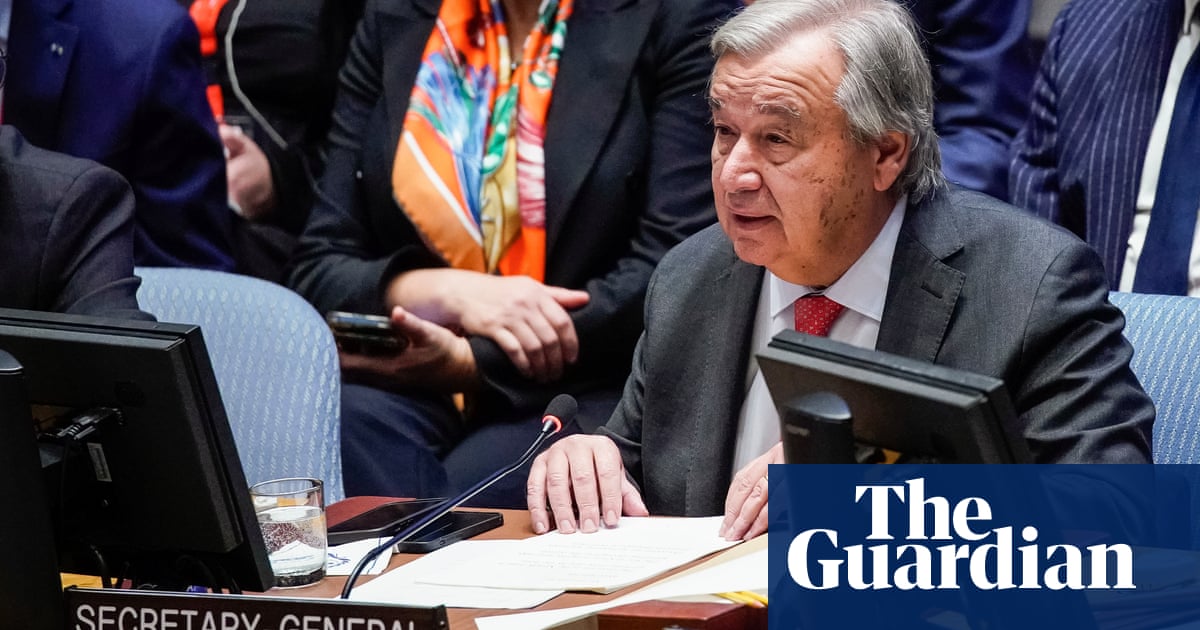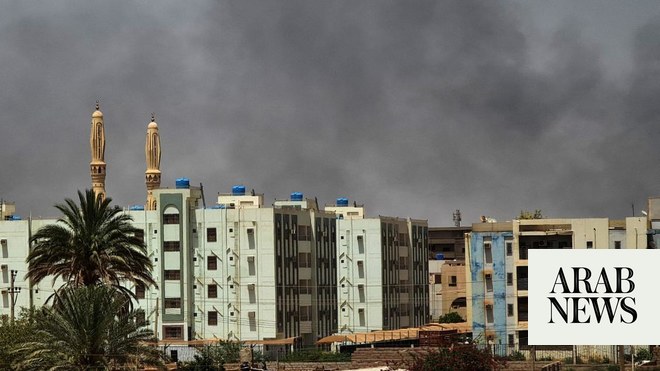
António Guterres, the UN secretary general, was locked in a bitter row with Israel on Wednesday, saying he was shocked that the Israeli government had misrepresented remarks he had made to the UN to suggest he had justified the Hamas attacks on Israel on 7 October.
Israel has called for his resignation, accusing him of a blood libel and announcing that it was withdrawing travel visas for UN officials, including the UN humanitarian coordinator, Martin Griffiths.
The personal tensions between the Guterres and Israeli officials comes as UNRWA, the UN humanitarian agency for Palestinian refugees, warned that it was hours away from being forced to close its operations in Gaza, including the provision of hospital care, due to Israel’s blockade on fuel. Israel also vowed to stop UN officials coming to Israel in a bid to teach the UN a lesson.
Israel is furious that Guterres had suggested the attacks by Hamas could not be seen in a vacuum but followed decades of occupation. Guterres had also accused Israel of clear violations of humanitarian law in the Gaza strip, and insisted that a humanitarian ceasefire was vital, a position that the US was close to accepting even if it would not use the term ceasefire, but instead a “humanitarian pause”. There were also reports that Israel was under pressure from the US to delay a ground invasion. The French president, Emmanuel Macron, said a massive a massive ground invasion by Israel would be a mistake.
Without mentioning Israel by name, a furious-looking Guterres made a press statement in New York recalling that in his remarks on Tuesday he had specifically said no Palestinian grievance could justify the horrendous attacks by Hamas.
Rebutting the criticism and insisting it was necessary to re-establish the truth, he said “I am shocked by the misrepresentations by some of my statement … as if I was justifying acts of terror by Hamas. This is false. It was the opposite.”
Guterres had told the UN security council on Tuesday: “It is important to also recognise the attacks by Hamas did not happen in a vacuum. The Palestinian people have been subjected to 56 years of suffocating occupation.”
In his statement on Wednesday, Guterres pointed out that in his speech he had stated: “But the grievances of the Palestinian people cannot justify the appalling attacks by Hamas. And those appalling attacks cannot justify the collective punishment of the Palestinian people.”
Israel’s ambassador to the UN, Gilad Erdan, responded by accusing the UN of continued bias and hatred of Israel. He added: “It is a disgrace to the UN that the secretary general does not retract his words and is not even able to apologise for what he said yesterday. He must resign. The secretary general once again distorts and twists reality. He clearly said yesterday that the massacre by Hamas did not happen in a vacuum. Every person understands well that the meaning of the words is Israel has guilt for the actions of Hamas or at the very least it shows his understanding of the ‘background’ leading up to the massacre that Hamas perpetrated.”
Earlier, Erdan said on army radio: “Due to his remarks, we will refuse to issue visas to UN representatives. We have already refused a visa for the undersecretary general for humanitarian affairs, Martin Griffiths. The time has come to teach them a lesson.”
The response reflects a long-running Israeli belief that UN agencies, especially the UN human rights council, have an anti-Israeli agenda. But there was also strong support among Arab countries for Guterres’s approach. There are also signs that western countries, without directing him, want the Israeli prime minister, Benjamin Netanyahu, to re-evaluate his strategy, including by cooperating with the UN.
It is not clear how far Erdan’s proposed visa ban extends within the UN hierarchy. A large number of UN workers, for instance, are employed by UNRWA.
Griffiths, a former British diplomat and special envoy on Yemen, has been forthright in warning that levels of UN aid into Gaza are woefully inadequate. He has repeatedly called for a ceasefire to allow aid into the territory. There was no sign that Israeli pressure was having any impact on the UN’s willingness to issue warnings about the dire crisis inside Gaza. UNRWA, by far the largest humanitarian provider in Gaza, warned that unless fuel is allowed into Gaza immediately, the agency will be forced to halt all operations tonight.
Last week the US vetoed a UN resolution tabled by Brazil calling for a humanitarian pause to allow aid into Gaza since it did not explicitly allow for Israel’s self-defence.
Later on Wednesday, the UN security council will vote on rival proposals by the US and Russia to address shortages of food, water, medical supplies and electricity in Gaza.
The US resolution reaffirms Israel’s right to collective and individual self-defence, but for the first time comes close to endorsing a humanitarian pause.
The US draft resolution calls for “all measures necessary such as humanitarian pauses to allow for the full rapid safe and unhindered humanitarian access, consistent with international humanitarian law for UN agencies and other impartial humanitarian agencies … to ensure the unhindered provision of water, electricity, food fuel and medical supplies”. Russia’s counter-resolution calls for a swift and unconditional ceasefire.
The UN security council has not reached a collective unanimous decision on Israel since January 2009, when resolution 1860 (2009) was adopted. The US has vetoed resolutions on Israel a total of 46 times, including last week.
Speaking on Tuesday night, the US secretary of state, Antony Blinken, said the US supported a humanitarian lull. Blinken said Hamas must cease using people as human shields and that Israel must take all precautions to avoid harm to civilians.
“It means food, medicine and water and other assistance must flow into Gaza and to the areas people need them,” Blinken said. “It means civilians must be able to get out of harm’s way. It means humanitarian pauses must be considered for these purposes.”
Asked to expand on Blinken’s comments, the national security council spokesperson, John Kirby, said: “We want to see that all measure of protection for civilians and pauses in operation is a tool and a tactic that can do that for temporary periods of time.”
Kirby said the difference between a humanitarian pause and a ceasefire was “a question of duration and scope and size and that kind of thing”.
Although it is clear that the US opposes a formal ceasefire, the distinction between a humanitarian pause and a humanitarian lull is less immediately apparent.
After Guterres’s remarks, the Israeli foreign minister, Eli Cohen, said in a tweet: “I will not meet with the UN secretary-general. After the 7 October massacre, there is no place for a balanced approach. Hamas must be erased off the face of the planet!”
Asked to comment, the UN spokesperson Stéphane Dujarric said that the secretary general would be meeting representatives of the familiies of hostages being held by Hamas in Gaza, adding that they would be accompanied by a representative of the Israeli permanent mission to the UN. It was later reported that some of the hostages’ families had resisted pressure from Cohen not to meet Guterres.
Guterres may have angered Israel, but it was notable that Blinken continued to meet him after he had spoken, and many other countries that spoke later in the debate were sharply critical of Israel’s operation against Hamas in Gaza.
Sameh Shoukry, the Egyptian minister for foreign affairs, said the Palestinian territories were going through horrific developments. “It is shameful that some continue to justify what is happening, citing the right to self-defence and resisting terrorism,” he said.










